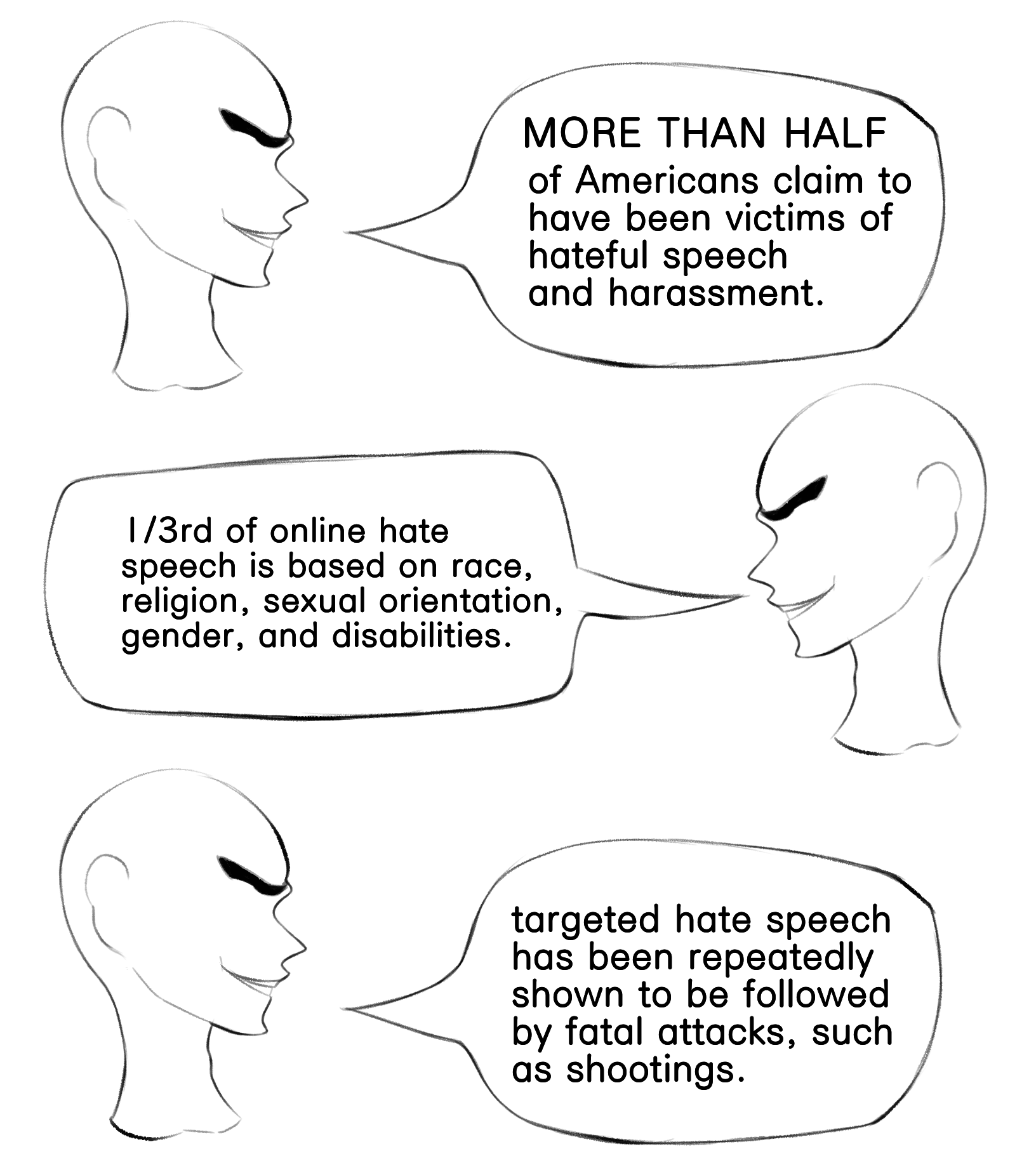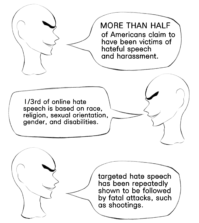

Recently, the use of dehumanizing language at Aragon has caught many students’ and teachers’ attention. This issue has been at the forefront of multiple staff meetings with the objective of finding ways to prevent offensive language from being used on campus. The administration refers to dehumanizing language as “language used to demean a person due to race, ethnicity, gender, sexual orientation, religious affiliation or disability status.”
One person who experienced dehumanizing language was senior Amanda Safi when she was walking to her fourth-period class. She overheard some boys saying ‘Are you on your period again?’ to each other.
“I felt angry because one, it was wrong. They’re taking our strength and turning it into a weakness in a way that is derogatory. A girl having her period [experiences] a spectrum of emotions … [but] still has the strength to continue on with [her] day,” Safi said. “[And] two, I also felt a little bit disrespected … on behalf of the entire female species … because a lot of us go through this excruciating pain every month and we don’t really make an effort to display or complain to the people around us.”
Safi believes that the media plays an important role in how students interact with one another.
“What we see in the media is kind of what we think is normal. Certain stereotypes that are perpetuated in the media enter into our philosophy, into our way of thinking,” Safi said. “And so if they see in the media that it’s normal to say the N-word or it’s normal to call girls out on their periods … they’re going to start doing it too.”
Safi was also once called a terrorist by an Aragon student on Snapchat due to her Middle Eastern background. She did not really process this experience until she learned about 9/11 in AP US History and the stigma against Middle Easterners.
“There are just some things you don’t really joke about,” Safi said. “And I feel like that really crossed the line because they were using my ethnicity against me, which is not cool.”
Dehumanizing language has also been used against the African American community.
During this spring semester, the Black Student Union decided to put up the N-word campaign posters again. They were originally taken down last year. Their purpose was to prevent the use of the N-word, a word used to degrade African Americans.
“Just because the posters aren’t up doesn’t mean you can say that word,” said senior BSU president Taylor Jackson. “[It] is discriminating and derogatory language … We put the posters up to remind people about the N-word campaign.”
However, the posters were not effective and students continued to hear the word from their classmates. BSU plans to have a panel that incorporates all the cultural clubs to advocate for diversity.
“When someone calls me the N-word, I feel like I’ve been stripped of my dignity. All of my accomplishments and personality traits are being disregarded and I’m being reduced to this disgusting word meant to make me feel … less than a human who doesn’t deserve to be respected,” said senior Nyella Walter. “The worst part is that the word is senselessly directed at people only because of the color of their skin, which in no way measures a person’s humanity, yet people continue to think it somehow does.”
Jackson reflects on the time she was called the N-word.
“Whenever I hear someone use the N-word, I think back to that harsh time when my people didn’t have any rights,” Jackson said. “[I think], are we going back in time? Are we going back to the 60s? It really triggers those emotions [and] I don’t feel safe in this place because these people are dehumanizing me and discriminating against me.”
Walter believes rap music stirs up the encouragement for students to say the N-word.
“A lot of the rap songs use [the word]. [People are] not necessarily thinking about the painful history of this word,” Walter said. “They’re singing lyrics, but I think people need to take a step back and really think about what the word means. And maybe choose not to say it in the lyrics and in their daily vocabulary.”
A recent event involving dehumanizing language occurred when students in math teacher Cheri Dartnell’s first period class discovered a discriminating message targeted towards the LGBTQ+ community written in Chinese on the whiteboard. The message was written on Friday at a club meeting and stayed until next Monday’s first period.
“I was disappointed that someone would take advantage of my room being open at lunch for a club,” Dartnell said. “It’s very disrespectful to me, to the room [and] to the students.”
Many meetings that are held each week, such as faculty meetings and Professional Learning Community meetings are now devoted to talking about dehumanizing language.
“As a school, we’ve been working on something called Multi Tiered Systems of Support,” Dartnell said. “We’re trying to develop an identity for the school … So [the prevention of dehumanizing language] fits right into what we’re trying to work on: to identify what it means to be an Aragon student.”
Aragon has formed a language campaign consisting of a group of teachers that educate staff on how to encourage students to be more proactive about the situation. This campaign also works with the parent group. The language campaign team meets together every six weeks and the smaller groups, such as the Student Communications/Policy group and the Family Outreach group, meet more frequently.
“We want students to be those up-standers who are going to help educate each other and help be positive role models for each other,” said assistant principal Nicole Elenz-Martin. “[This campaign] is more like this professional development education, forward-thinking, positive movement in order to be able to address the issue … [that] this is not language acceptable as part of being in the Aragon community.”
Additionally, the professional development coordinators seek speakers that can educate students around this topic. In the past, Aragon hosted speakers such as Minnijean Brown-Trickey. Aragon is currently looking for more future opportunities like this.
“We are always looking to be able to bring in people to work with the staff and to work with the students,” Elenz-Martin said. “Of course, it’s a cost of money when you bring in speakers, and it’s a cost of time and availability of resources, but it’s always something that we’re open to because we do feel when it’s done right, it can be very powerful.”
Aragon plans to address dehumanizing language in their new Core Values and Behavior expectations.
